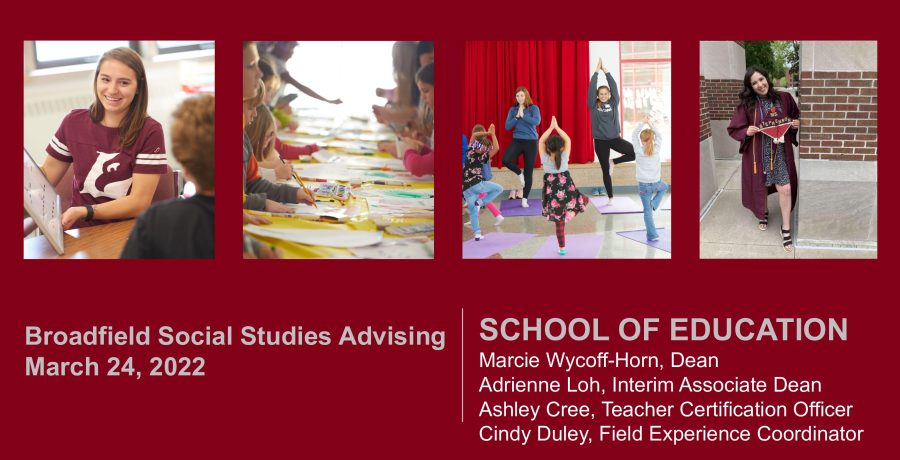Letter to the Editor: School of Education inequity
November 2, 2022
A semester has passed since the University of Wisconsin-La Crosse students challenged the School of Education (SOE) — and nothing has been done.
Last year, many SOE students, particularly those in the broadfield social studies program (BFSS) had their graduation plans disrupted because of issues with finding placements. The solutions brought forth by the Deans of the SOE, Dean Wycoff-Horn and Interim Associate Dean Loh, and the Dean of CASSH, Dean Kunkel, included studying abroad for a semester and reapplying to the program, changing the content area from social studies to science, math, or English, or choosing a different career entirely, such as “school psychologist” or “community activist.”
While the School of Education states there are difficulties in finding space in local schools for all BFSS students (which is valid considering teacher turnover during the pandemic), they still have yet to provide students with actual solutions, such as any alternatives to their clinical experiences (field) or financial support for added semesters.
Simply put, the School of Education has only acted to minimize the number of students accepted into their programs instead of considering ways to accommodate students during a nationwide teacher shortage or improve UWL’s teacher preparation to be more competitive with other UW schools.
Telling students to go abroad and change career paths is simply not an acceptable way to address the problems surfacing in the program, and it was deeply unprofessional to assume that students would agree to these alternatives.
These recommendations also force students to invest more money into their education, in addition to the cost of taking the edTPA ($300) and purchasing the iPad (~$400-500). The administration claims it has a commitment to equity and strives to prepare teachers to be “responsible citizens in a diverse and dynamic world,” yet it has more barriers to graduation than any other university in the UW system. Leadership has also been unsuccessful in eliminating these issues — even though they have been on their desks for years.
According to the @uwledmajors Instagram page, during an open meeting at the end of last year, the SOE Dean Wycoff-Horn claimed that student advocacy had been noticed by Wisconsin’s Department of Public Instruction (DPI), and they were now asking questions.
Allegedly, DPI intervention posed a real threat to closing the School of Education. During this meeting, professors, who are experts in the field and have K-12 teaching experience, voiced their perspectives about student concerns and DPI involvement anonymously. These questions and concerns have been raised by students and faculty alike. One wrote, “What is DPI investigating?” Another added, “Why would DPI punish faculty when it is leadership that is weak?”
Regarding the inequitable standards of the School of Education, particularly the BFSS program, professors challenged the administration:
“What is going to be done outside of ‘change majors, leave UWL, or go study abroad?”
“We told you in the August 2019 meeting that the climate was bad. You ignored us and gave us workshops. You never wanted the truth. The students brought some truth.”
“The policy stopping students and graduating needs to be addressed especially since we are the only one of the 13 system schools who still have this policy.”
“Why can’t we cut the iPad requirement loose immediately?”
“Why can’t we open residence halls for a month for student teachers?”
“The issue of not having housing has been forever. There never seems to have been any will to solve the problem, just shrugged shoulders that ‘it is the way it is.’ Will something be done?”
“An iPad is not a necessity for technology integration.”
“How are we supporting minoritized students? How are we valuing students from marginalized backgrounds? I am worried about how devalued our disabled SOE students feel and often are.”
One response said that student chalking and protesting was “expected” and “part of a struggle that has been going on for years.”
Since this meeting, not much has happened, other than education professors joining many students in leaving UWL for other universities. A group called the Dean’s Advisory Council was formed, which represents a positive step forward, but it cannot address any immediate needs or establish long-lasting change. Many teacher candidates will go to a university that does not have students pay for expensive exams/technology, dismiss student concerns with lack of housing, or suggest “studying abroad” or changing career paths as suitable solutions to large numbers in the program.
Compared to other programs in the UW system, UWL has significant barriers to graduation and financial burdens, which makes this university unattractive to prospective teachers. In other words, DPI doesn’t need to be the ones to shut down our program — the policies in the School of Education might do the job for them.
Additionally, the recent controversy with the UWL’s College Republican’s chalking demonstrated that the university is capable of protecting hateful, antisemitic speech, yet the chalk left by the School of Education students was erased almost immediately for criticizing the administration. This raises the question of whether our campus has been upholding standards of equity or inclusion— and this question deserves some serious answers.
If the School of Education and UWL are truly committing to equity, they will explore ways to eliminate barriers to graduation, secure more placements for students, make the iPad a choice instead of a requirement, reconsider or find alternatives to the edTPA and FoRT requirements, and investigate housing options for student teachers in need — all of which are things they have been asked to do for years.
As a future teacher myself, I say with full sincerity that advocating for my students is a professional and ethical responsibility I take very seriously. It is my wish that the School of Education reflected this responsibility. These inequities have been around for years, and it is time for a change.
Respectfully,
Mary Miller
For more information surrounding SOE events from last semester, read here.
____________________________________________________
Letters to the Editor do not reflect the beliefs or values of The Racquet Press.






